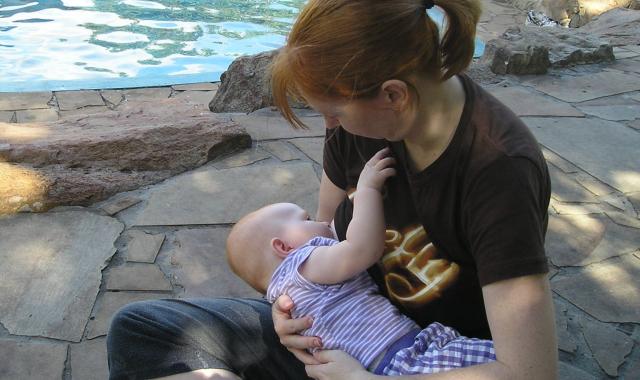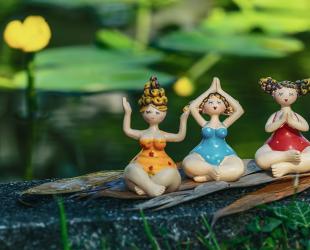Simple tips to help you stay comfortable and meet your baby’s needs when it’s hot

Most parts of Australia get very hot in summer. Heat can be tiring for everyone, and both you and your baby may need a little extra care to stay comfortable and well hydrated.
When it’s hot, being close can feel sticky and uncomfortable. It’s normal for some babies to be a bit fussy and seem less keen to feed in the heat.
Keeping feeds comfortable (for you and your baby)
If skin contact feels too warm, you could place a light muslin wrap, pillowcase or cloth nappy between you and your baby.
Try a cool, damp face washer in the crook of your arm while feeding.
Feeding while lying down can be more comfortable. Only your breast and your baby’s mouth need to touch.
If your baby's skin feels too warm, sponge them frequently with lukewarm (body temperature) water or give frequent baths. Plain water is fine; soap can dry their skin.
A fine mist water spray can help older babies cool down.
Remember your fluids. Keep water handy and drink to thirst. Many parents find it helps to have a glass or bottle of water at each feed and placed in a few spots around the house.
Common concerns about babies in the heat
It’s common to worry that your baby needs extra fluids when it’s hot. You might wonder about giving boiled water or juice ‘just in case’. For exclusively breastfed babies under 6 months, extra fluids aren’t needed.
The NHMRC Infant Feeding Guidelines state that exclusively breastfed infants don’t require additional fluids up to 6 months of age. Giving water to a young baby can be harmful because their kidneys aren’t fully developed.
If you offer the breast whenever your baby cues, they’ll get what they need. On hot days, many babies feed more often for shorter periods, just like you might sip water more often.
Breastmilk is ideal in the heat
The milk at the start of a feed helps quench thirst; as the feed goes on and your breast softens, the fat content rises and satisfies hunger. Your milk is a living fluid that changes to meet your baby’s needs, even with the weather.
For older babies and toddlers who aren’t exclusively breastfed, you can encourage sips of water between breastfeeds and offer extra quick feeds. Cooling snacks can also help. Try frozen fruit pieces like orange quarters, peeled banana or pineapple slices. You can even make expressed milk ice blocks.
You can check any time that your fully-breastfed baby is getting enough breastmilk.
In very hot weather, urine on cloth nappies may dry quickly, so you might need to smell the nappy to tell if it’s been wet. Disposable nappies should feel heavy after use unless they’re changed very frequently.
If it’s extremely hot, you may need to gently wake your baby for extra feeds to keep up their fluids. Fewer wet nappies, dark urine with a strong ammonia smell, and a hot, unhappy baby can mean they need more fluids. If your baby won’t feed well, is very sleepy, and has dry skin and mouth, dull sunken eyes, and a sunken fontanelle, seek medical care straight away.
Some babies start a feed, then pull away quickly in the heat. They might only want enough to take the edge off their thirst. Others may skip longer feeds during the hottest part of the day and then feed more in the evening, overnight or early morning when it’s cooler.
If feeds are tricky even after cooling things down, see ABA’s breast refusal suggestions or talk with a breastfeeding counsellor.
Travelling in hot weather
- Some babies get sleepy in the heat while travelling. You may need to stop more often and wake them for feeds.
Feeding and letting baby stretch out on a rug in the shade can help them cool down.
Car air conditioning can be drying. Even if you feel cool, your baby may need extra short breastfeeds on long trips.
Enclosed prams can become very hot and airless. An open weave bassinet, lay back stroller, baby hammock or portable cot is often cooler for rests. If using a pram or stroller, always do up straps and keep a close eye on baby.
Extreme heat and emergencies
In extreme or emergency situations like evacuations, you’ll want to be prepared for feeding your baby
Fully breastfed babies are very portable. If you’re feeding expressed milk or your baby has formula, you’ll need more supplies in your emergency kit. Power or clean water may be unavailable, so take extra care with preparing feeds: Caring for your baby when there is a boil water or do not drink notice
© Australian Breastfeeding Association September 2025


